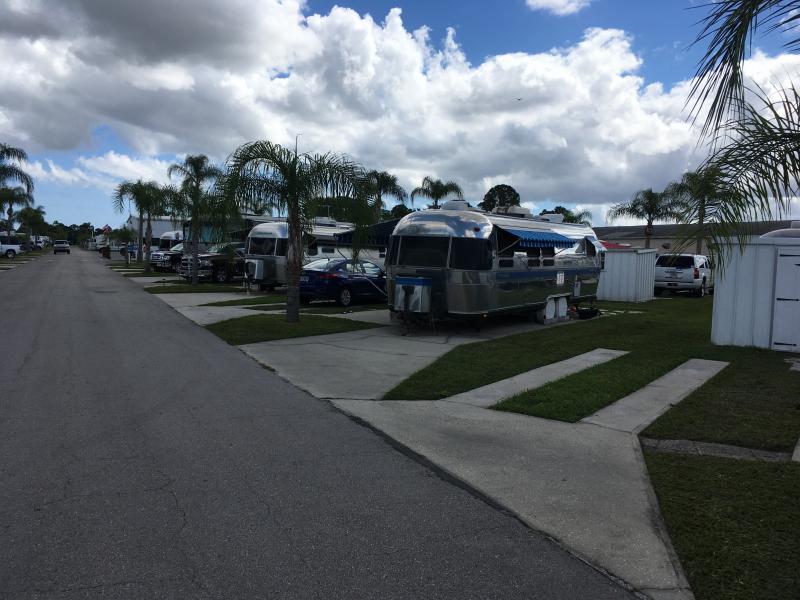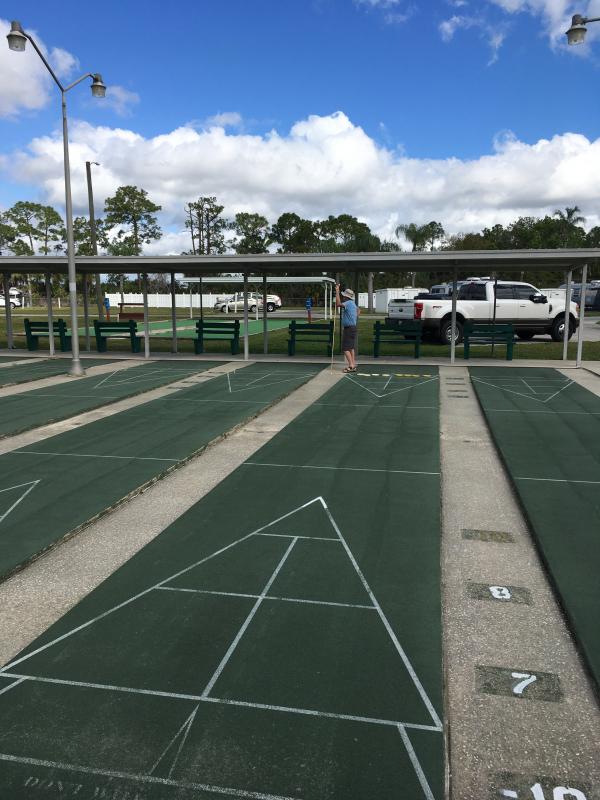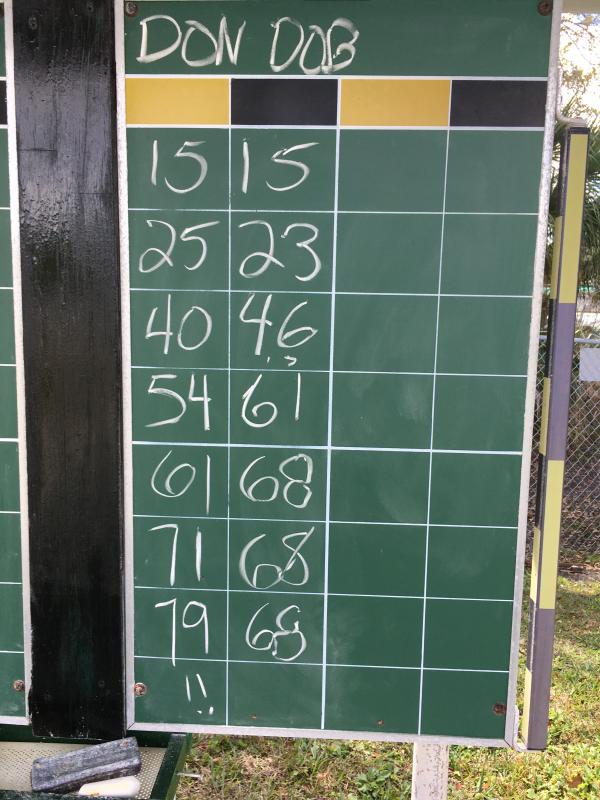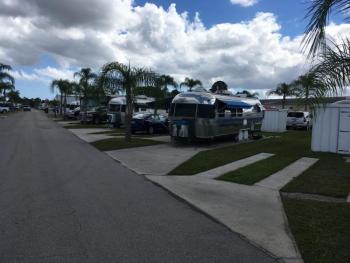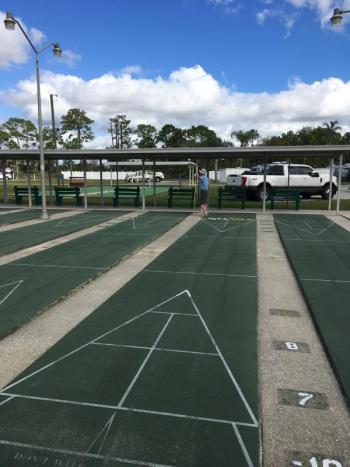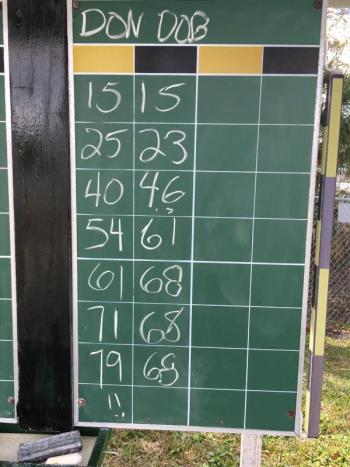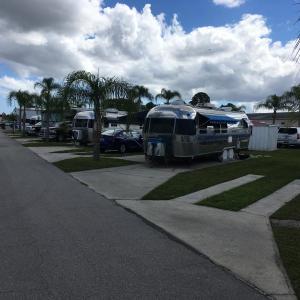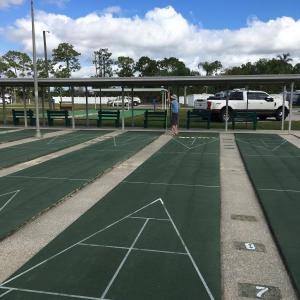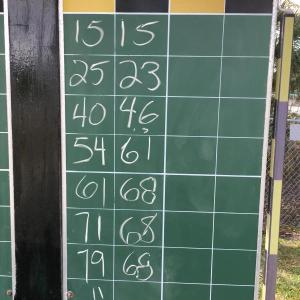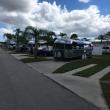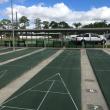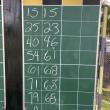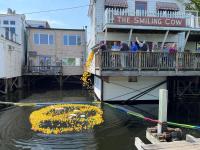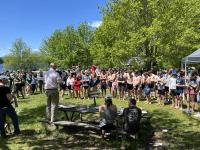This Week in Lincolnville: Beaten by a Blind Man
I usually wake up running through the day’s schedule, you know, pick up chicken feed at Aubuchon, finish doing the taxes, check up on the Schoolhouse renovation, clean out the seed trays, what to plant.
Etc.
Here amongst the Land Yachts (AKA Airstream trailers) there’s only one thing we need to fit in – two morning shuffleboard games. If we don’t get at it before 9 the sun will be too high to stand.
It’s my excuse when I lose, yet again, to the blind man. That would be Don, my partner of the past four years. He taught me the game the first year I came down here to the east coast of Florida with him. His macular degeneration has worsened over these years so that if you see him out and about, he won’t be able to see your face.
Or, I thought, the shuffleboard court.
This park was developed originally for Airstreams, those sleek, aluminum tubes that still turn heads when they glide by. They were considered the crème de la crème of recreational vehicles, though sometimes detractors referred to them as silver suppositories.
That’s so yesterday. Even in the few years I’ve been coming here almost half the 350 Sites are occupied by those ginormous motor homes we see sailing over our Maine roads every summer. Time was, according to Don, they weren’t even allowed into this exclusively Airstream park.
The park is located in a busy city on the Atlantic Ocean, though the beach is eight traffic-clogged miles away, a hop, skip and a jump from I95, and under the flight path of an active airport. Between the planes, the many species of large birds flying over, and the occasional Cape Canaveral launch, we, along with the park’s other residents, spend a good deal of time looking up.
Long-time residents of this place are actually stockholders in the corporation that leases sites to Airstreamers, motor homers, fifth wheelers (Do you know what that is? I had to have it explained. It’s a trailer that sits its nose in the bed of a pick-up — preferably a very husky pickup — and gets pulled along on its two rear wheels). Fifth wheelers can be almost as big as the largest motor home.
Some people leave their trailers on their site year-round, though most haul them home at the end of the season. Only some 20 sites are actually occupied with people living on them year-round. Coming here last week for the first time in two years had Don a bit worried. What would he find inside an aluminum can that had been shut up tight for the past two summers and a winter and a half?
Back in March of 2020 everyone abandoned ship so to speak, getting home while they could as the pandemic began stalking us like the Red Death of Edgar Allen Poe’s imagination. We’ve since learned that a few hardy souls came down here last winter, and according to general lore there wasn’t a single case of Covid among any one at the park.
Don unlocked the door the day after we’d arrived in Florida (non-stop, 4 hours from Bangor) to find everything looking perfect. No puddle of water, no popped rivets (apparently a uniquely Airstream issue), no obvious mouse nests. Only a few mysterious little poops on the floor where my expertise came into play. “That’s not rat poop,” I announced (remember, Don can’t see very well at all, so I get to decide what stuff is and isn’t) “and it’s not mouse turds either.”
Eventually, when he opened one of the trailer’s myriad little locked compartments, he scared up a rather large gecko. That’s what had invaded the place we decided. Anyway, a few swipes with a paper towel and all was fine.
What do people who live together in about 200 square feet do all day? Most are couples, and the singles are mostly widow/ers, the remaining member of what was once a long marriage. Folks have grandkids somewhere else — up north could mean Georgia or Canada. Or Maine. Some have been coming here since they retired many years ago. Don and Jean were visiting her folks in this park more than 20 years ago, and then decided to make it their winter home base.
A 350 site park is pretty large with over two miles of roads. People ride bikes and trike-like bikes, and they walk. A few use a walker, but most are under their own power. Some stroll, but most are purposeful. I’ve only seen on actual power-walker. Every site comes with a 10’ x 1 0’ metal shed to keep a washer and dryer, hoses, tools, a grill, bikes, all the stuff that won’t fit inside the trailer.
I like walking around the park after dark and peeking inside a lighted shed to see the different ways people make use of those little spaces. I keep referring to ours as the barn for some reason. We do most of our cooking out there, on the hot plate or portable oven or grill. The trailer comes equipped with a slick little gas stove top, but it heats up the trailer too much. The fridge is gas-powered, but I have no idea how gas makes ice cubes.
The shower is about 18” square; I’ve seen no obese people here. There’s no way they’d fit in a trailer shower. The water gets nice and hot, the flush is connected to a sewer line, and if it gets too cold here in Florida the trailer has a furnace.
Connecting up all that stuff the day we arrived occupied Don for a couple of days. About all I could do to help was to line up the threads on the hoses he had to screw together. Other than that, the blind man did fine.
There’s a central hall where people get their mail, pay for their leases, register complaints. A large room complete with a stage for visiting musicians, for Sunday church services, for weekly Bingo and regular “ice cream socials” (all you can T dishes of ice cream for $1.50), billiard tables (about 8 of those) and the best WI-FI in the park.
Like all communities this place has it’s stories. Like the guy who fell asleep over his laptop late one night in the rec hall; when they found him his screen was still displaying the porn that had put him to sleep. Or the woman who spent her days inside her trailer watching her neighbors’ every move. Or the wonderful, raucous French spilling out from the coterie of Canadians partying late into the night. Sadly, most of the Canadians haven’t returned after the disruption of Covid and its banning of border crossing.
Much of the infrastructure of this place — the wood shop, Boche courts, shuffleboard, even the clothes drying yards — were built with the volunteer help of residents. And because this is a 55 and over park the residents are, by definition, transient. They get old and sick and die. With time, there’s no one who actually remembers them.

